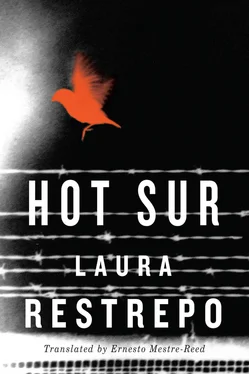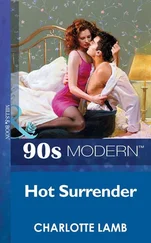It was impossible to shut the woman up. Rose had thought of passing by her house for ten or fifteen minutes, just long enough to get a sense of Cleve’s activities before his death. But this pass-by on Staten Island threatened to go long, an eternal visit, because there was no holding back the tongue of this woman once let loose. And there was Rose, bound hands and feet, although even before he had been asked to come inside he had regretted making the visit. He began to feel ill. He felt as uneasy there as he had in Pro Bono’s office, even becoming nauseated, as if suddenly particles from the old landfill had gone down his throat. What the hell am I doing here, he asked himself, when all I want is to be home with the dogs? Then he answered his own question: I’m doing this for Cleve, or rather for me, to find out what happened to Cleve.
“Bolivia and I liked to watch as the waves took our Peruvian lilies and swallowed them,” Socorro continued. “They were simple flowers, nothing more. But the important part was the gesture, our way of expressing gratitude for being in this country.”
While she chattered away, Rose asked himself how old this woman could be. Sixty? A well-preserved seventy? She made him sit in one of the couches in the tiny living room, upholstered in white jacquard and covered in see-through vinyl, and explained with tears in her eyes that Bolivia had been the most industrious and motivated woman you could imagine, and that she had not deserved the fate that befell both her daughters, both of them so pretty, the image and likeness of her, the mother. Then she sang something softly in Spanish, taking both of Rose’s hands in her tiny cold ones with long red nails, because as Rose knew, Latinos like to touch, they touch other people, even those they don’t know, they hug them, they kiss them, because they’re not afraid of a stranger’s flesh. Socorro finally let go of his hands after a while, but Rose thought it excessive, because although he admired that nice custom of touching, he never really practiced it — let’s just say that he wasn’t a militant member of the group Free Hugs, those loving young men and women giving out hugs and human warmth on the streets to people who are not necessarily interested. And then Socorro asked him if he wanted a tinto , explaining that’s what they called coffee in her country, something he already knew.
“Bolivia’s two daughters, so beautiful and so unfortunate. The first one pursued by the law, the second one sick in the head,” Socorro said as she disappeared through the kitchen door to make the tinto, while Rose brought his hands to his nose to inhale the strong scent of the moisturizing cream that Socorro used on her hands.
He looked around, somewhat dazed by the countless pieces of porcelain, not one portion of a wall without a shelf and not one shelf that wasn’t packed with figurines, those nostalgic tributes to an unimaginable pastoral era: girls wearing wide-brimmed straw hats and holding geese in their arms; couples in love and gazing into each other’s eyes on park benches; tiny chocolate houses; barefoot shepherd boys, poor yet wholesome; shepherd girls, poor yet pretty, in wooden clogs. It was a strange sensation to be amid that porcelain world, but Rose grew accustomed to it, and before long he and his host were talking as if they had known each other for ages, two old women drinking tintico in their respective white jacquard chairs protected from grime by plastic.
“Parallel fates,” Socorro declared, “Bolivia’s and mine. But at the same time not so much, don’t believe it, Mr. Rose. More like crossed fates. You be the judge.”
Bolivia and Socorro had both been born in Colombia in the same town and in the same year. They went to the same grade school run by Salesian nuns and were friends from the very first. A bit later, Socorro’s family, which was better off, moved to the capital, and this left Bolivia trapped in her little provincial sinkhole. Socorro graduated from grade school and the family celebrated with a black-tie affair at the local social club.
“I had a silk shantung dress in the imperial style custom-made,” she said, “and my hair was put up in a loop bun, that was the style then, the loop bun, very big ones, and I complemented it with aquamarine earrings I was given for the occasion. By this point, Bolivia had decided to start working, you see, she had decided to forsake her studies before the third year of high school. She became a stylist, manicurist, and a beautician and was hired to work mornings at the D’Luxe Salon and during the afternoons as an assistant at a dress shop.”
But they spent the Christmas vacations together, like when they were girls, and they couldn’t wait to meet up in their old neighborhood and go to festivals or attend services, always sharing their dreams of one day leaving the country, looking for their destinies elsewhere. They’d fly off very far away. And their dream came true. They both ended up in New York, Socorro first and Bolivia seven years later. In New York, they soon reunited, didn’t even have to search each other out, because Socorro had already made herself a home in America, how could she not help the other, who was a sister recently arrived. She assured her: “ Mi casa es tu casa , stay with me until you can get settled” and “This is the land of open paths, just walk the paths and all paths lead to Rome; it’s not about getting there, it’s about getting on the path.” She repeated these motivational maxims and others as she emptied three of her drawers and helped her unpack. Everything was fine up to that point, two friends who loved each other and a dream realized. But later the divergences began, the little misunderstandings in spite of their great partnership, and Socorro began carelessly unleashing other sayings such as “To each his own home” and even this other one, “Guests are like fish; they stink after three days.”
“I’m telling you step-by-step,” Socorro clarified, “so you understand. Bolivia had always been a beautiful woman, short but lively, with dreamy eyes and eyelashes like a doll, but not me so much, my beauty was more inside, like my husband said. You will judge on your own; I have never been a beauty. I’m what is known as a woman of intellect.”
And yet Socorro had married a man who was well off, or at least established. He was a plumber, did his work professionally, made good money, wanted to have a family, and immediately fell in love with the Colombian woman he met at Coney Island, on line for the Wonder Wheel, then the tallest Ferris wheel in the world. It happened that they shared the same coach — how frightened Socorro had grown with such heights, how she covered her eyes and screamed — and that was enough for him to know that this woman was destined to become his wife. On the second date, he brought her a leather-bound copy of Kahlil Gibran’s The Prophet , which Socorro pulled out of a box to show Rose, proud of the dedication that said in green ink, “To Socorro who loves me so much,” and signed Marcus Clancy Salmon. Rose found the dedication strange, thinking that perhaps it should have said, “To Socorro, whom I love so much,” but Salmon had his own methods, and it was evident they worked for him, for on their third date, during a stroll in the Brooklyn Botanical Gardens, by the Japanese pond, he triumphantly proposed marriage to Socorro, who delightedly accepted the two-carat diamond that would seal their union.
“He was Jamaican and I was Colombian, and God knows how we communicated because he didn’t speak Spanish and I didn’t understand his English. Maybe that’s why the whole thing worked; you know how it is,” Socorro winked again. “The language of caressing and spoiling is more beautiful than the one of reason and logic, am I not right?”
Читать дальше












